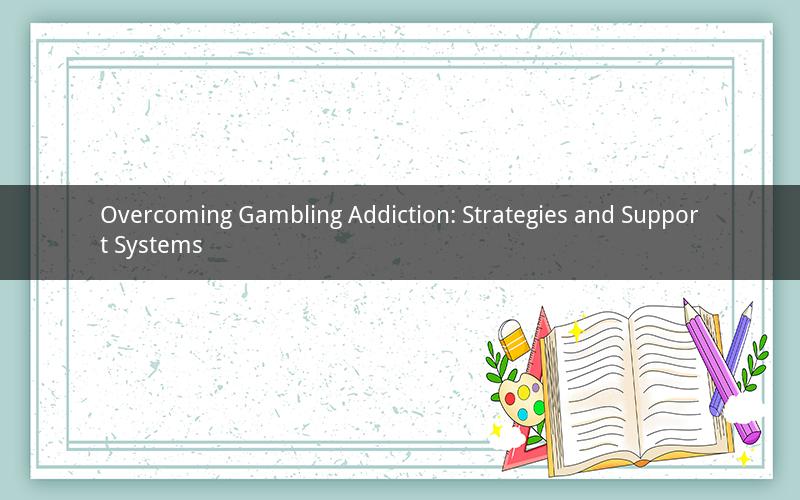
Introduction:
Gambling addiction is a complex issue that affects individuals from all walks of life. It can lead to significant financial, emotional, and social consequences. If you or someone you know is struggling with gambling addiction, it's important to understand the various strategies and support systems available to cope with this challenging problem. In this article, we will explore how to deal with gambling addiction, including identifying the signs, seeking professional help, and building a strong support network.
Understanding Gambling Addiction:
1. What is gambling addiction?
Gambling addiction, also known as pathological gambling, is a psychological disorder characterized by an inability to control gambling behavior, despite the negative consequences. It is considered a type of impulse control disorder and is classified as a mental health condition.
2. Common signs of gambling addiction:
- Preoccupation with gambling thoughts and activities
- Needing to gamble with increasing amounts of money to achieve the desired excitement
- Feelings of anxiety or depression when unable to gamble
- Relieving negative emotions by gambling
- Continuing to gamble despite repeated attempts to stop
Strategies to cope with gambling addiction:
1. Recognize the problem:
The first step in overcoming gambling addiction is to acknowledge that you have a problem. This may involve taking an honest look at your gambling habits and their impact on your life. If you are unsure whether you have a gambling addiction, consider the following questions:
- Do you spend more time and money on gambling than you intended?
- Are you neglecting important responsibilities due to gambling?
- Has gambling caused financial, emotional, or social problems in your life?
- Do you feel compelled to gamble, even when you know it's harmful?
2. Create a support system:
Building a strong support network is crucial for overcoming gambling addiction. Here are some ways to establish a support system:
- Seek family and friends: Reach out to trusted individuals who can provide emotional support and hold you accountable.
- Join a support group: Groups such as Gamblers Anonymous offer a safe space to share experiences and gain support from others who understand the challenges of gambling addiction.
- Consider therapy: A therapist, particularly one specializing in addiction, can help you develop coping strategies and address underlying issues contributing to your gambling addiction.
3. Develop healthy coping mechanisms:
Identifying and adopting healthy coping mechanisms is essential to avoid falling back into gambling behavior. Here are some strategies:
- Exercise: Regular physical activity can improve your mood, reduce stress, and provide a healthy outlet for releasing negative emotions.
- Practice mindfulness: Mindfulness techniques, such as meditation and deep breathing exercises, can help you stay grounded and present in the moment, reducing the urge to gamble.
- Engage in hobbies: Focusing on activities you enjoy can distract you from the desire to gamble and provide a sense of accomplishment.
- Limit exposure to gambling triggers: Avoid places, websites, or social situations that may trigger your gambling urge.
4. Create a financial plan:
One of the most significant consequences of gambling addiction is financial strain. Creating a financial plan can help you regain control of your finances and reduce the temptation to gamble:
- Set a budget: Establish a realistic budget that includes essential expenses and savings goals.
- Pay off debts: Focus on paying off any gambling-related debts as quickly as possible.
- Consider seeking financial counseling: A financial counselor can help you develop a comprehensive plan to manage your finances and avoid future gambling-related issues.
5. Seek professional help:
If you find it challenging to overcome your gambling addiction on your own, seeking professional help is essential. A therapist or counselor can provide personalized guidance and support. Treatment options may include:
- Cognitive-behavioral therapy (CBT): CBT helps you identify and change negative thought patterns and behaviors contributing to your gambling addiction.
- Medication: In some cases, medication may be prescribed to help manage symptoms of anxiety or depression associated with gambling addiction.
- Residential or outpatient treatment programs: These programs offer structured support and therapy to help individuals overcome gambling addiction.
Conclusion:
Overcoming gambling addiction is a challenging but achievable goal. By recognizing the problem, seeking support, and developing healthy coping mechanisms, individuals can take steps toward a healthier, more fulfilling life. Remember, it's never too late to seek help and make positive changes.
Questions and Answers:
1. Q: Can someone with a gambling addiction recover completely?
A: Yes, with the right support and treatment, individuals with gambling addiction can recover completely and lead a fulfilling life.
2. Q: Is there a cure for gambling addiction?
A: There is no definitive cure for gambling addiction, but with effective treatment and ongoing support, individuals can manage their addiction and lead a healthy life.
3. Q: Can family members be affected by a loved one's gambling addiction?
A: Yes, family members can be significantly impacted by a loved one's gambling addiction, experiencing financial, emotional, and social consequences. It's important for them to seek support and education on how to cope with the situation.
4. Q: How long does it take to overcome gambling addiction?
A: The duration of recovery from gambling addiction varies for each individual. Some may experience significant improvement within a few months, while others may require ongoing treatment and support over a longer period.
5. Q: Can medication help treat gambling addiction?
A: Medication can be prescribed in some cases to help manage symptoms of anxiety or depression associated with gambling addiction. However, medication alone is not considered a cure and is often used in conjunction with therapy and other treatment methods.